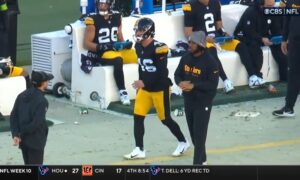The offseason is inevitably a period of projection and speculation, which makes it the ideal time to ponder the hypotheticals that the Pittsburgh Steelers will face over the course of the next year, whether it is addressing free agency, the draft, performance on the field, or some more ephemeral topic.
That is what I will look to address in our Buy or Sell series. In each installment, I will introduce a topic statement and weigh some of the arguments for either buying it (meaning that you agree with it or expect it to be true) or selling it (meaning you disagree with it or expect it to be false).
The range of topics will be intentionally wide, from the general to the specific, from the immediate to that in the far future. And as we all tend to have an opinion on just about everything, I invite you to share your own each morning on the topic statement of the day.
Topic Statement: The NFL should have moved the Steelers’ game against Washington to Monday and the Ravens’ game against Dallas to Sunday, even though it would have meant surplus, unnecessary shuffling.
Explanation: While the NFL made the right decision to not only postpone the Ravens’ game against the Steelers, but also their subsequent game against the Cowboys (which was scheduled for this Thursday), it is fair to question whether or not they should have moved that game to Sunday, and moved the Steelers’ game against the Washington Football Team to Monday instead.
Buy:
The key piece of evidence in the argument for the Steelers having their game against Washington pushed back as well comes in the October memo that I referenced yesterday that makes it clear that a game will not be postponed solely due to competitive or roster concerns.
In the same memo, it also makes clear that any rescheduling of games would be made with the principle in mind that the opponent whose fault it is would bear the larger burden. Specifically, it reads: “the burden of any competitive, financial, and other consequences [for a game being postponed] will fall more heavily on [the club whose situation caused the postponement], particularly if the club has not adhered to the health and safety protocols or has failed to cooperate in contact tracing or other reviews in response to positive tests among club players or staff”.
Sell:
The Steelers, however, also had players test positive, or at least be placed on reserve, on the same day that the game was postponed a second time, the day that the Cowboys game was also postponed. So it could be argued that both teams were responsible for the second postponement.
The Cowboys game had to be moved, because it would have occurred just two days after the Steelers game. The Washington game did not have to be moved, and Washington is not involved in the situation at all, so it would not be fair to them to move their game when they are not even a part of the conversation.
Additionally, the league also takes into consideration minimal invasiveness. Moving only the Ravens’ next game, rather than that game and the Steelers’ next game, is less movement, without major inconvenience, and thus preferable.








